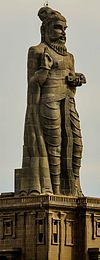Yu Hsi
Yu Hsi | |
|---|---|
| Born | 16 March 1951 |
| Nationality | Taiwanese |
| Occupation | Poet, photographer, musician, producer, director and writer |
| Known for | Translating Tirukkural in Mandarin[1] |
| Website | www |
Yu Hsi (born Hung Ching Yu) (born March 16, 1951) is a Taiwanese Tamil poet and scholar, who has translated the Tirukkural and the poems of Subramaniya Bharathi and poet Bharathidasan in Mandarin. He is the founder president of the Tamil Sangam in Taiwan. He has received various awards, including awards from Seoul World Academy of Arts and Culture (2004), Thiruvalluvar Award (2014), and a felicitation from former President of India A. P. J. Abdul Kalam.
Personal life[edit | edit source]
Yu Hsi was born Hung Ching Yu in Fangyuan township, Taiwan, on 16 March 1951. He obtained a doctorate in letters. He has authored more than 60 books. In a unique literary style, he wrote his fifth long-form novel on tradition scrolls, which contained almost 600,000 words.[2] He has also translated Tamil classic Thirukkural, poems of Bharathiyar and Bharathidasan and Avvaiyar's "Aathichoodi" (containing morals) into Mandarin.[3] He has been ordained a Buddhist monk as Dao Yi.[4]
Fascination toward Indian religion and philosophy[edit | edit source]
Yu Hsi revealed that he was greatly fascinated about Hinduism and Indian philosophy. According to him, great wisdom lay in the Indian religion and philosophy. He counted Hindu god Ganesh as his favorite for having scripted the Mahabharata as told by sage Vedavyas. According to Yu Hsi, Lord Ganesha typifies the journey of enlightenment, just like those of ancient Buddhist monks. He also considers the characters of Krishna and Arjuna to have influenced him greatly.[4]
Translating the Tirukkural[edit | edit source]
In May 2010, Yu Hsi had a chance meeting with former President of India A. P. J. Abdul Kalam when the latter presented him with a copy of the Tirukkural[4] and a golden statue of Buddha.[5] The Kural text reminded him of the Hindu mythologies of Ramayana and Mahabharata and their virtuous characters, which he was fascinated about 30 years earlier.[4] Yu Hsi then agreed to translate the Thirukkural into Chinese[5] and completed it in about three months.[4] He also installed a life-size statue of Valluvar, the author of the Kural text, in Taiwan.[4]
Awards[edit | edit source]
In 2004, Yu Hsi was awarded the Poet Laureate, the highest honour awarded by Seoul World Academy of Arts and Culture.[2]
In praise of his translation of the Tirukkural in Mandarin, the Tamil Nadu government awarded ₹540,000. Yu Hsi, however, donated the amount to Tamil University for setting up of an endowment to propagate Tirukkural.[1][2]
In 2008, Yu Hsi received the Jan Smrek Prize in Bratislava, Slovakia, for his poetry inspired by Buddhism. On the occasion, his five long poems were published in Slovak translation under the title "Cesta" (Road).[citation needed]
In 2014, he received the Thiruvalluvar award from the Government of Tamil Nadu. Yu Hsi is the first foreign scholar to receive the Thiruvalluvar award.[2][6][7]
See also[edit | edit source]
References[edit | edit source]
- ↑ 1.0 1.1 Rajaram, R. (19 June 2014). "Chinese translation of Tirukkural, Bharathi's poems ready". The Hindu. Chennai: The Hindu. Retrieved 19 August 2016.
- ↑ 2.0 2.1 2.2 2.3 Express News Service (16 January 2014). "Taiwan-origin Tamil Scholar Gets Thiruvalluvar Award". The New Indian Express. Express Publications. Retrieved 19 August 2016.
- ↑ PTI (7 November 2015). "Taiwanese poet Yu Hsi lauds TN CM Jayalalithaa". Business Standard. Retrieved 19 August 2016.
- ↑ 4.0 4.1 4.2 4.3 4.4 4.5 Renganathan, L. (29 July 2017). "A monk's love for Thirukkural". The Hindu. Thanjavur: Kasthuri & Sons. Retrieved 6 August 2017.
- ↑ 5.0 5.1 Express News Service (20 May 2010). "Kalam felicitates Taiwanese poet Yu Hsi". The New Indian Express. Chennai: Express Publication. Retrieved 19 August 2016.
- ↑ Sadique, Shahnawaz (17 January 2014). "Taiwanese Poet Dr Yu Hsi Was Awarded The Thiruvalluvar Award on 15 January 2014". Commonstupidman.com. Retrieved 19 August 2016.
- ↑ "திருக்குறளில் இல்லாதது எதுவும் இல்லை: திருவள்ளுவர் விருது பெற்ற தைவான் கவிஞர் யூசி பேச்சு". The Hindu (Tamil) (in Tamil). Chennai: Kasturi & Sons. 16 January 2014. Retrieved 6 August 2021.
{{cite news}}: CS1 maint: unrecognized language (link)
External links[edit | edit source]
